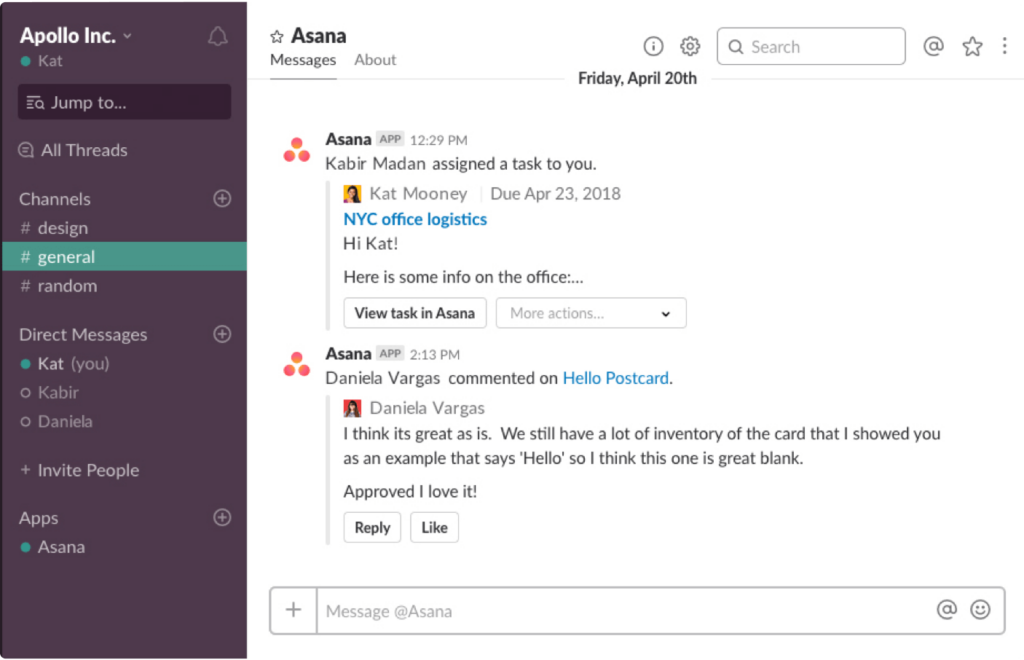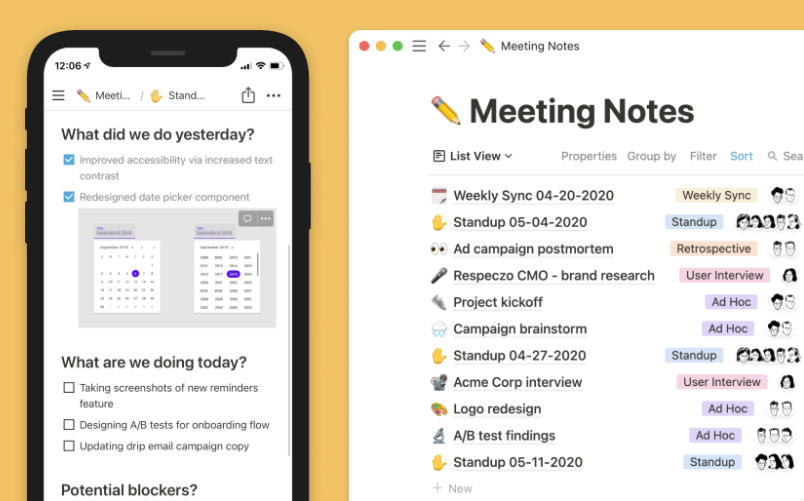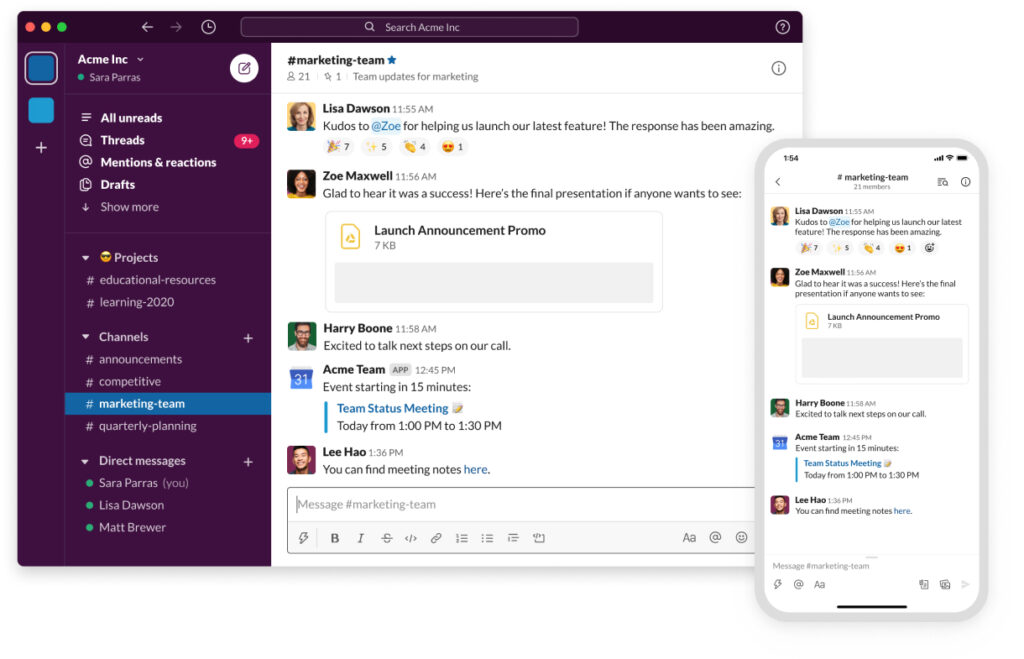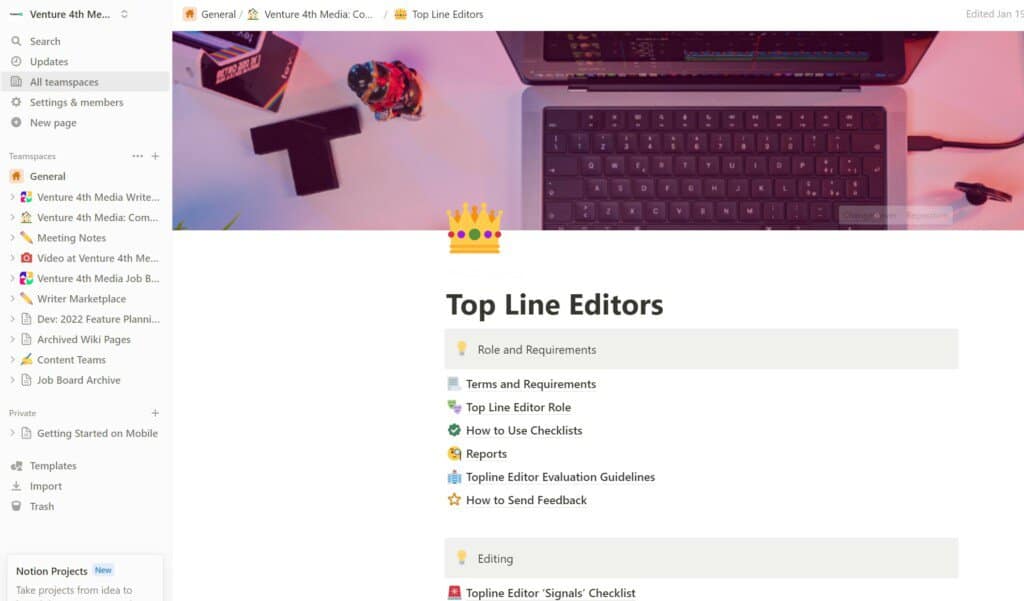Last Updated on August 12, 2023 by Ewen Finser
Wondering which digital tool, Notion or Slack, is the optimal choice for your business? I’ve been in your shoes, grappling with the same dilemma.
I have a love/hate relationship with Slack. It’s core to our business and we cannot go back to Skype or *shudder* TEAMS, but it’s also not a great place to track projects and knowledge management.
Notion – on the other hand – is an incredibly flexible “LEGO” building block approach to workplace management. I’ve seen some really incredibly dashboards and tools that could only have been built in Notion without hiring a development team.
That said, Notion is almost overwhelming in it’s optionality.
So in this comparison I’ll break down how I’ve thought about each platform in our business and some ideal use cases for each (or both!).
My TL;DR Overview of Notion and Slack
Choosing the right tool for team collaboration and project management can be a minefield. Oftentimes it feels like sacrificing one side for at the expense of the other.
Having uses both systems, Notion used WITH Slack is really the ideal setup in my experience. In other words, you may not have to choose one over the other.
Side note: Slack is great for real-time information and “putting out fires” in our company BUT the nature of it’s design kind of means EVERYTHING gets the same immediate precedence, even if it’s not that important.
This is where Notion really shines. There’s a lot of “work” and “knowledge” that shouldn’t just sit in a chat history.
By using a system like Notion, it provides a forcing function for thinking through problems and building enterprise knowledge over time. This leads to better continuity of operations, less communications “wasted time”, and just better coherent thinking. For me it’s reminiscent of Amazon’s famous one-pager and six-pager proposals.
Main Differences Between Slack and Notion
These are the main points of difference I’ve identified between Notion and Slack:
- Purpose: Slack is primarily a communication tool designed for real-time messaging, while Notion is an all-in-one workspace for note-taking, project and task management, and database handling.
- Real-time Communication: Slack excels at real-time communication, with superior chat features, including direct messaging, group chats, and channels. Notion, however, lacks real-time messaging capabilities.
- Task Management: Notion shines in task management with its versatile and customizable to-do lists, kanban boards, and calendars. Slack, on the other hand, is not primarily designed for task management, although it allows for simple task creation and tracking through integrations.
- File Sharing: Both Slack and Notion support file sharing, but Slack’s capabilities are more robust, with quick previews and easy searchability. Notion’s file sharing is more document-centric.
- Collaboration Tools: Notion has robust collaboration tools, including real-time document editing and commenting. Slack focuses more on communication-based collaboration, with real-time discussions and shared channels.
- Integration Options: Slack offers a wider range of integrations with other tools and services, while Notion has fewer integrations but supports embedding of various apps and services within its pages.
- Pricing Models: Slack operates on a freemium model, with more features available in paid plans. Notion also offers a free version with more comprehensive features available in its paid plans. However, Notion’s paid plans generally offer more value for money due to its broader functionality.
Comparison of Notion and Slack
In terms of real-time collaboration and communication, Notion and Slack are both powerful tools that facilitate seamless teamwork.
Real-time collaboration and communication
I’ve been amazed at the transformation in how we work ever since Notion and Slack stormed onto the business scene. Both these platforms are synonymous with real-time collaboration and communication, changing how teamwork looks and feels.
If you’re after quick communication with your team, then Slack is a perfect fit for that pattern of interaction.
However, if your focus is on making teamwork more efficient through iterative collaboration, then Notion would be a suitable choice. It offers an environment where every edit or comment can be seen in real time by everyone involved in the project.
This open communication approach minimizes misunderstandings and quickly resolves potential conflicts as they arise. Whether it’s co-editing documents or brainstorming ideas for your next digital marketing strategy, these tools provide an open platform to foster creativity and progress at speed.
Asynchronous ideation and organization
Navigating the digital workspace with ease is no small feat. That’s where applications like Slack and Notion come into play, offering unique features to help businesses streamline projects and enhance communication.
Focusing on asynchronous ideation and organization, I find that Notion clinches a win. Here’s why- It provides a structured space for ideas to develop at their own pace without the pressure of immediate response that is often associated with Slack’s real-time interface.
This substantial approach promotes thoughtful contributions over spontaneous reactions, encouraging team members to craft well thought-out responses rather than quick fixes or uninformed decisions.
It’s an innovative tool for managing content-rich projects where in-depth understanding prevails over speed.
Features and ease of use
As a B2B operator or digital marketer, you need software that is not only packed with useful features but also easy to use. When comparing Notion and Slack, both platforms offer a range of features to enhance communication, collaboration, and organization within your team.
However, Notion excels in providing a seamless user experience with its intuitive interface and customizable workspace. With drag-and-drop functionality, rich media embedding, and the ability to create databases and templates, Notion allows you to tailor the platform to meet your specific needs.
Additionally, its offline access feature ensures that you can continue working even without an internet connection. On the other hand, while Slack offers powerful messaging capabilities and integrations with popular apps like Google Drive and Trello, its user interface may require some getting used to for newcomers.
Integration capabilities
Notion and Slack both offer integration capabilities, allowing users to connect and collaborate seamlessly across different platforms.
With Notion’s integration with Slack, teams can send messages directly to a Notion database, receive notifications in Slack, and share links that expand with Notion.
This enhances team collaboration and communication by streamlining the flow of information between these two popular tools.
Whether it’s project management, team communication, or database management, the integration capabilities of Notion and Slack ensure that B2B operators and digital marketers have the necessary tools to work efficiently and effectively.
5 Ways Notion Excels Over Slack
This isn’t normally a section I include in a comparison, but I think it’s worth highlighting because I see SO many companies stuck in the “instantaneous communications loop” that really prevents critical thinking & organizational learning over time.
To this end, Notion excels over Slack in five key areas.
Leadership and collaboration through writing culture
As B2B operators and digital marketers, we understand the importance of effective leadership and collaboration in driving business success. Notion excels over Slack when it comes to fostering these crucial aspects through a writing culture.
With Notion, teams can communicate and collaborate seamlessly by creating and collaborating on documents in real-time. This promotes transparency, accountability, and encourages team members to contribute their ideas and insights.
It also allows leaders to provide clear direction and guidance, ensuring everyone is aligned towards achieving common goals. Furthermore, the ability to organize thoughts and ideas within a document makes it easier for teams to stay organized, track progress, and iterate on strategies.
Coherent communication and reduced urgency
In the fast-paced world of digital marketing and B2B operations, coherent communication and reduced urgency are crucial for success. Notion stands out from Slack in this aspect, providing a platform that allows for more organized and streamlined communication.
With Notion, you can enjoy a work environment where messages are clear, discussions flow smoothly, and information is easily accessible. This reduces the sense of urgency often felt in Slack conversations, allowing for more focused and efficient collaboration.
As we navigate the future of work, it’s essential to embrace tools like Notion that prioritize coherent communication and create a calmer working atmosphere for better productivity and teamwork.
Substance and focus for faster progress
In the fast-paced world of business, substance and focus are key factors for driving faster progress. Notion excels over Slack in this aspect, providing a platform that encourages deep collaboration and thoughtful ideation.
With Notion, B2B operators and digital marketers can leverage its writing culture to foster leadership and collaboration among team members. By emphasizing substance over urgency, teams can prioritize quality work rather than getting caught up in constant communication distractions.
This leads to more efficient and effective outcomes, enabling businesses to move forward at a quicker pace. Furthermore, with features like Alive Design, Notion keeps content fresh and motivated, inspiring teams to consistently produce high-quality work.
Alive Design for fresh and motivated content
Notion excels over Slack when it comes to providing fresh and motivated content for the future of work. With its “Alive Design” concept, Notion offers a dynamic and visually engaging platform that keeps ideas alive and inspires teams to be more creative and productive.
This design approach encourages collaboration, innovation, and continuous improvement, making it an ideal tool for B2B operators and digital marketers looking to stay ahead in today’s fast-paced business environment.
While Notion CAN be made to do almost anything, I personally prefer it as a company (or personal) Wiki or SOP guide. A sort of dynamic handbook for processes and standards.
Space for substantive ideation and evolution
Notion outshines Slack when it comes to providing a space for substantive ideation and evolution in the future of work. Notion’s versatile platform offers a creative playground for B2B operators and digital marketers looking to foster innovation, creativity, and problem-solving in the workplace.
With its intuitive design and collaborative features, Notion encourages teams to brainstorm new ideas, refine concepts, and evolve strategies together. It provides a dynamic environment where ideas can flourish, grow, and transform into actionable plans.
Unlike Slack’s primarily messaging-based interface, Notion offers a broader range of tools that support deep thinking, exploration of possibilities, and the cultivation of fresh perspectives.
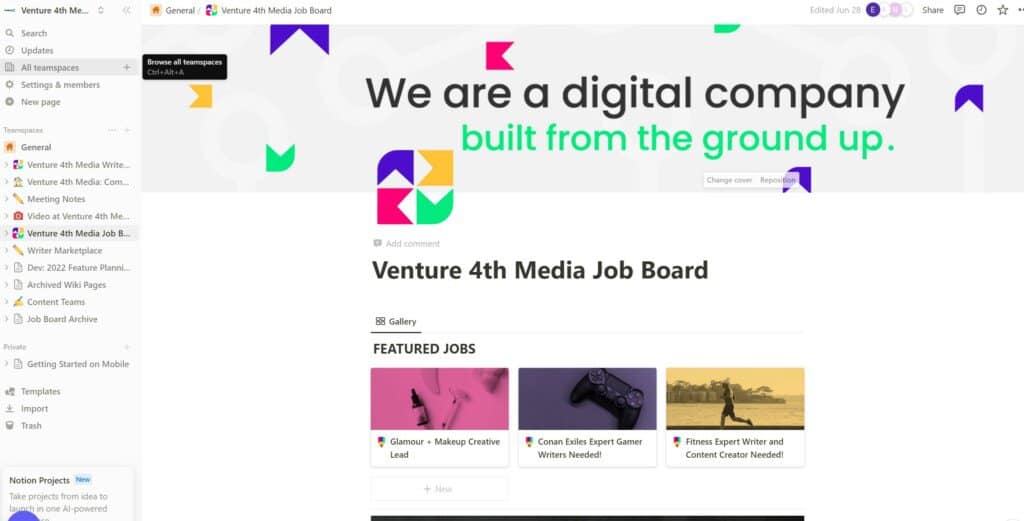
Notion vs Slack Summary
Here’s my summary of the key distinctions between these two platforms:
Feature |
Slack |
Notion |
|---|---|---|
Purpose |
Primarily a communication tool for teams, it’s designed for real-time messaging, file sharing, and collaboration. |
A comprehensive workspace tool that integrates notes, tasks, wikis, and databases. It’s more about information management and project planning. |
Real-Time Communication |
Offers real-time messaging, voice, and video calls. |
Doesn’t support real-time messaging or calling. It’s more asynchronous. |
Task Management |
Limited task management capabilities. Can be enhanced with integrations. |
Powerful task management features, including kanban boards, list views, and calendar views. |
File Sharing |
Supports file sharing and users can search within those files. |
Supports file sharing but doesn’t have a powerful search function like Slack. |
Collaboration |
Strong collaboration features through channels, threads, @mentions, and direct messages. |
Excellent for collaborative note-taking and project planning, but lacks real-time communication. |
Integration |
Integrates with a large number of third-party apps. |
Also offers a number of integrations but not as extensive as Slack. |
Pricing |
Freemium model with paid plans starting from $6.67 per user/month. |
Freemium model with paid plans starting from $8 per member/month. |
Other Notion Alternatives
I’ve used and tried many other project management and knowledge management systems. Here’s some of the direct comparisons either I (or our editorial team) has done:
- Notion vs Obsidian
- Notion vs Basecamp
- Notion vs Google Docs
- Notion vs monday.com
- Notion vs Evernote
- Notion vs Todoist
- Notion vs OneNote
- Notion vs Airtable
- Notion vs Coda
- Notion vs Trello
- Notion vs Craft
- Notion vs Slite
Other Slack Alternatives
When I was looking to move our team off of premium (expensive) Slack, I looking at a variety of established and up and coming real-time chat competitors:
- Slack vs Mattermost
- Slack vs Asana
- Slack vs Discord
- Slack vs Trello
- Slack vs Basecamp
- Slack vs Moxtra
- Best CRMs for Slack Integration
Conclusion: Notion or Slack?
While both Notion and Slack are popular tools for collaboration and communication in the workplace, they have distinct features that cater to different needs.
Notion excels in providing a comprehensive platform for organizing and managing projects, while Slack is known for its quick and efficient team collaboration.
My ultimate decision was to use Notion for dashboards, wikis, documentation, and internal company landing pages AND use Slack (free version) as our internal comms channel. Better yet, integrate them together for a more seamless experience.
Since we engage with many freelancers, the Slack model was quickly becoming unsustainable on the paid plans.
Rather than search chat history (one of Slack’s premium features), I just opt for a culture of writing things out completely with in Notion. In other words, if it’s something important enough to sticky, it should go into Notion or similar.
While Notion CAN be made to do almost anything, I personally prefer it as a company (or personal) Wiki or SOP guide. A sort of dynamic handbook for processes and standards.


